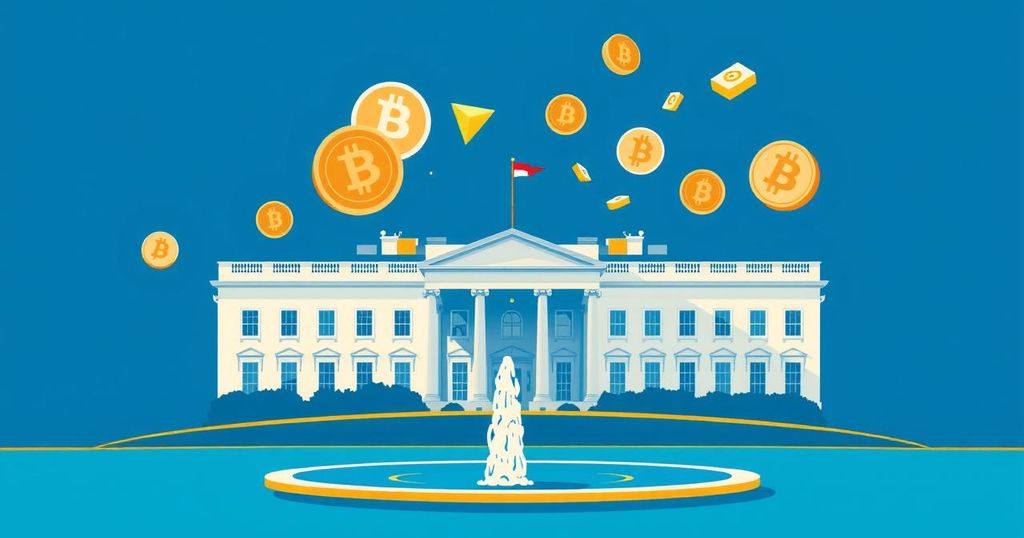Trump’s First 100 Days: A Pro-Crypto Agenda Unfolds
In his first 100 days back in office, President Trump has made notable strides in supporting the crypto industry. Key actions include the pardoning of Silk Road founder Ross Ulbricht, the establishment of a U.S. Strategic Bitcoin Reserve, and significant executive orders aimed at benefitting digital asset miners and reducing IRS regulations on crypto brokers. While initial steps show promise, the future of comprehensive crypto policy remains uncertain.
In a notable shift for the crypto sphere, President Trump is wrapping up his first 100 days back in office with significant moves toward supporting the industry—much to the delight of many crypto advocates. His administration has showcased a proactive approach on several fronts, including the pardoning of controversial figures and the signing of pivotal legislation. While questions remain about future regulations and policies, the initial actions signal a strong interest in embracing digital currencies.
Right off the bat, on January 21, Trump graced the crypto community by pardoning Ross Ulbricht, the infamous founder of the Silk Road. Sentenced to a double life term in 2015 for his role in the illegal online marketplace, Ulbricht has been a notable figure in the libertarian circles. Trump had made this promise a campaign hallmark, energising supporters who rallied for Ulbricht’s release as a potential sign of greater acceptance of cryptocurrency principles.
Just a couple of days later, on January 23, an executive order was issued addressing central bank digital currencies (CBDCs), which specifically prevented U.S. agencies from initiating any centralised digital currency projects. This was a significant win for those in the crypto community who are wary of CBDCs potentially stifling decentralized innovations. Additionally, the same order established protections for cryptocurrency miners and laid the groundwork for a working group to create a pro-crypto regulatory environment.
Then in early March, the administration followed up with a bold move—a call for a U.S. Strategic Bitcoin Reserve. This executive order, issued on March 6, aligns with Trump’s previous statements about making the U.S. a “Bitcoin superpower.” The envisioned reserve would source Bitcoin through forfeiture proceedings while also establishing a separate digital asset stockpile, a notable step towards formalising government involvement in cryptocurrencies.
Trump’s administration didn’t stop there. On March 7, the White House hosted a Crypto Summit, gathering key industry leaders, including figures from Multicoin Capital and Paradigm, in what was a historic first. This event underlined the administration’s commitment to engaging directly with crypto innovators, an unusual move for past White House administrations.
On April 9, Trump’s choice for SEC Chairman, Paul Atkins, was confirmed. Known for his relatively friendly stance toward the crypto sector, Atkins’ leadership is expected to mark a shift in how the SEC interacts with digital asset holders and firms. Trump had previously vowed to remove the Biden-appointed chair, Gary Gensler, seen as an adversary to many in the crypto community. With Gensler’s departure coinciding with Trump’s inauguration, proposals that ease federal oversight were anticipated.
The pro-crypto momentum continued when Trump signed a law on April 10 that abolished an IRS rule requiring decentralized finance platforms to adhere to strict reporting obligations. This rule had been viewed as overly burdensome, potentially hindering the growth of the crypto sector in the U.S. Notably, this was the first law a sitting U.S. president has enacted specifically supporting crypto, marking a significant milestone in the relationship between government and digital currencies.
In summary, as Trump finishes his inaugural 100 days of his new term, the approach to crypto appears firmly supportive. Yet it’s still early days; the emphasis now is whether the talk of reform and support leads to lasting policy changes that truly benefit the growing and evolving landscape of cryptocurrency.




Post Comment